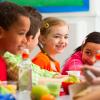This is not your mother's kindergarten.
The bar's been raised for school kids these days, thanks to increased
testing, legislation such as The No Child Left Behind Act, and
revved-up college entrance competition.
We now know that the path to school readiness begins at birth. It
begins with exposing young children to sounds, colors, books, movement
and socialization. And it begins with making sure they enter
kindergarten better equipped to think, to play and to learn.
"Readiness" takes on yet another meaning for educators: schools
carefully prepare to welcome, teach and guide our kids. It's valuable
to understand what goes into that process.
That's the thinking behind our monthly Getting School Ready column,
which began last year. By making the column a primary ParentMap focus,
we hope to help you navigate the readiness road.
Getting School Ready will continue to be a ParentMap priority. Future
articles will highlight parent/teacher interaction, nutrition, the new
state Early Learning and Development Benchmarks and more.
To access all 2004 Getting School Ready columns Click Here
In the meantime, here's a quick recap:
Getting excited:
You want your child to look forward to taking that Big Step and
entering kindergarten. How do you help him do that?
Talk to him about school, take him to the playground, visit the school
together and, most important, be upbeat. Diane Kroll, director of early
childhood services for the Puget Sound Educational Service District,
suggests reading your youngster books about going to school. "If the
parent is excited, the child will be," she says.
Developing emotionally:
Child development experts know that emotions play a big role in a child's ability to learn.
"We've asked the question, what permits us to absorb new experiences
and form social relationships?" says Bridgett Chandler of the Talaris
Research Institute. "We've found that emotional health is very
important."
Parents can help their kids learn about emotions through "emotion
coaching" strategies. Talaris researchers suggest parents be aware of
their children's emotions and encourage their children to talk about
their feelings.
Learning cooperation:
By the time children begin school, they should have developed social
skills that will help them take turns, respect others and form
friendships.
Educators hope that in kindergarten, kids will be able to hold their
own in a social world. "Social acceptance has a huge bearing on a
child's sense of self -- and it transfers into the classroom," says
family therapist Terry Hollinsworth.
Parents can foster socialization by praising their child's efforts at
sharing, and talking about how hurtful it is to be teased.
Introducing the arts:
Can exposure to the arts help prepare children for school? Researchers
answer with a resounding "yes." Many believe music stimulates the
brain, dance helps develop motor skills and drama teaches problem
solving.
"School is so much more than reading, writing and arithmetic," says
creative movement instructor Rachael Glass. "The arts provide a way for
children to discover they can make a contribution."
Keeping them moving:
When kids move, nerve cells in their brains get crucial stimulation.
That's why the most valuable early childhood experiences are those that
keep kids in motion -- and also involve touch, sight and sound,
according to Helene Freda, program developer for Gymboree Play and
Music.
Parents can encourage their kids to move by offering toys that move and
spin; dancing with them; giving them opportunities to climb and swing,
and taking them to gym or dance classes.
Helping children separate:
You can avoid big crying scenes at the kindergarten door by talking up
kindergarten -- and approaching the all-important first day with
confidence. Read books about school, shop for school clothes and tell
your child what he'll be doing.
If your child still has trouble separating, make a quick exit and leave
the rest to the teacher. "Teachers are skilled at steering these kids
toward an activity; most of them calm down," notes Diane Zipperman, a
counselor at the Jewish Day School in Bellevue.
Getting ready for the kids:
Schools begin preparing for students long before that first September
day. Many hold parent/student orientations, open houses, classroom
tours or special picnics or parties. The idea? So children -- and their
parents -- can connect more easily with the school and its faculty and
staff.
In addition, some schools assess student ability levels before
kindergarten begins. "This way, we can learn more about the students
and place them in groups," says Cheryl Grinager, principal at Green
Lake Elementary.
Gauging readiness:
Is your 5-year-old ready for school? These days, parents consider age
and maturity before launching their child into the world of academia.
Kids with summer birthdays give their parents particular pause: Will
they be the youngest? Will they be able to compete in the classroom and
on the soccer field?
Holding a child back isn't always the right answer, says counselor
Carol Robins. She suggests parents interview preschool teachers to help
assess their child's readiness level.
Fostering a love of learning:
Child-centered learning means teachers and parents take their cues from
the kids, drawing upon their interests and natural curiosity. It is a
method that focuses upon the student, not the instructor.
Early learning experts encourage parents to think about settings that
are child-centered when shopping for preschools and kindergartens.
"Child-centered learning is huge for school readiness," Bridgett
Chandler says.
Linda Morgan writes frequently on education issues for ParentMap.









